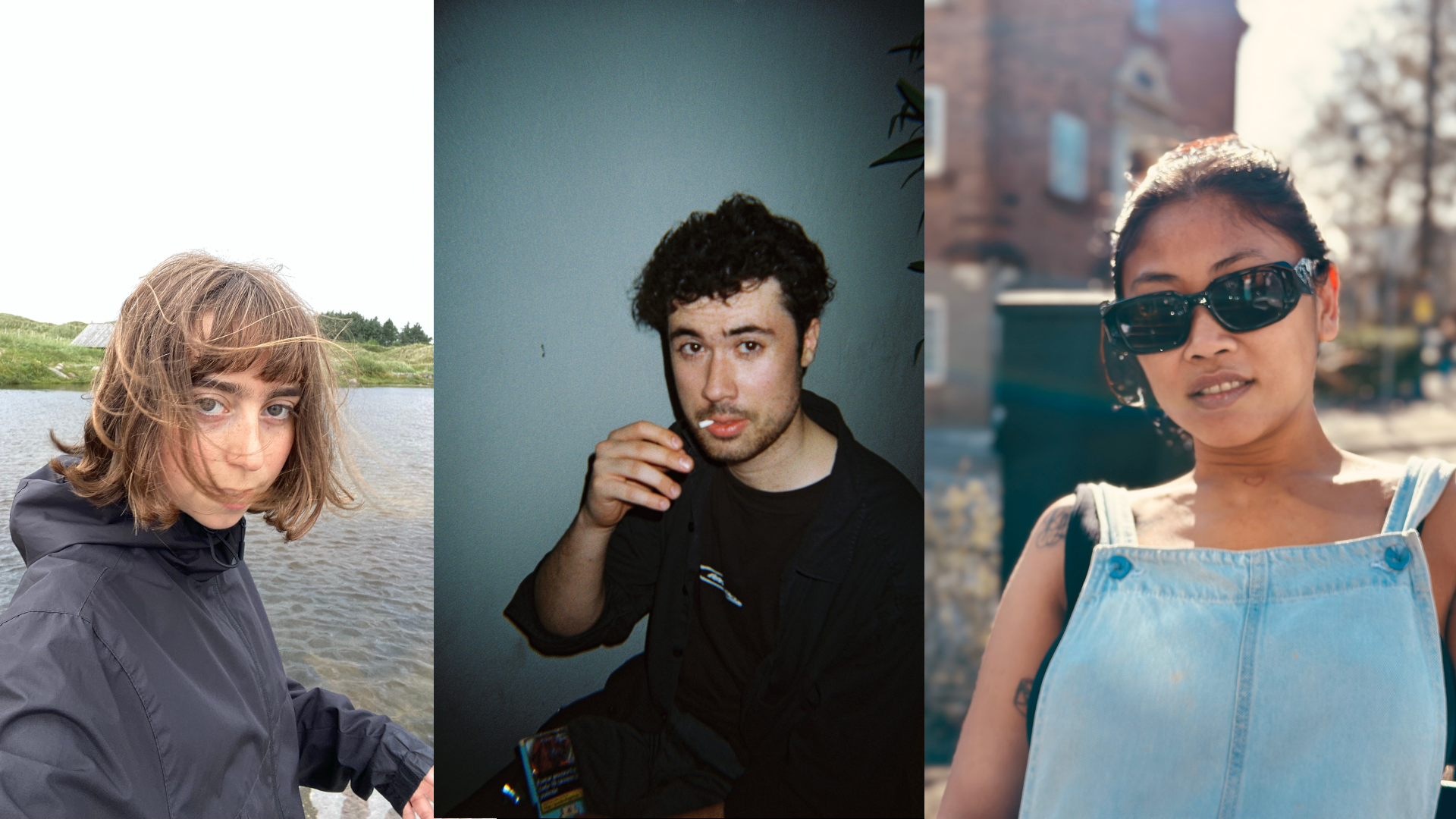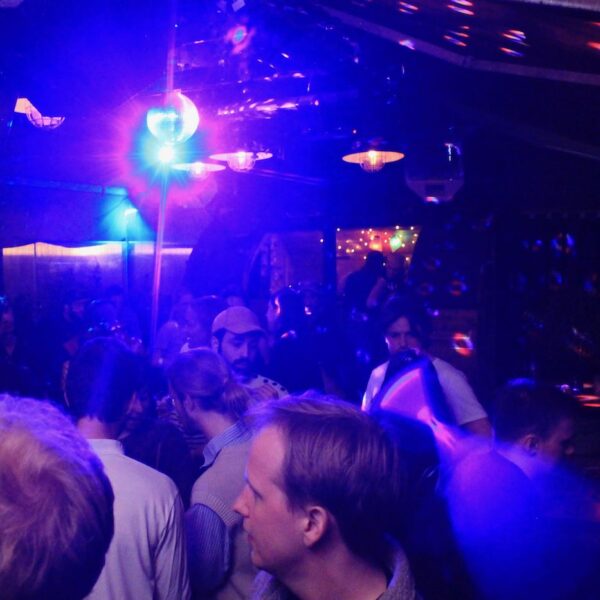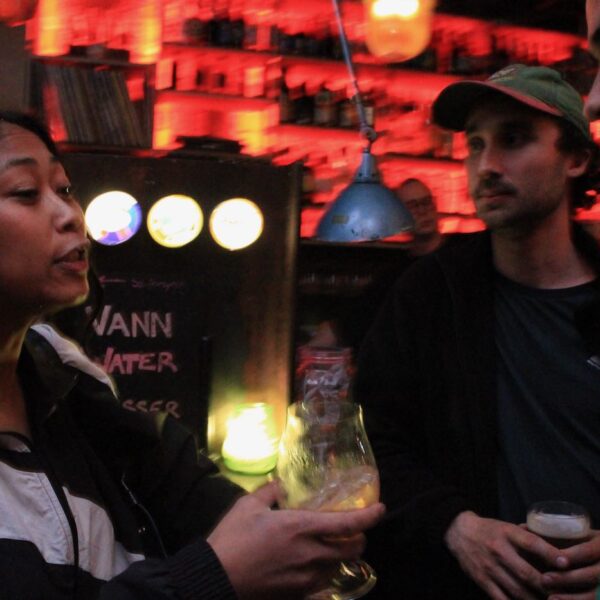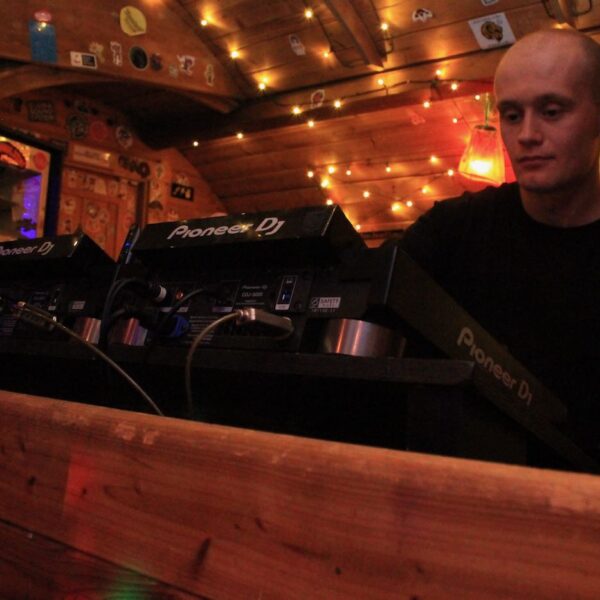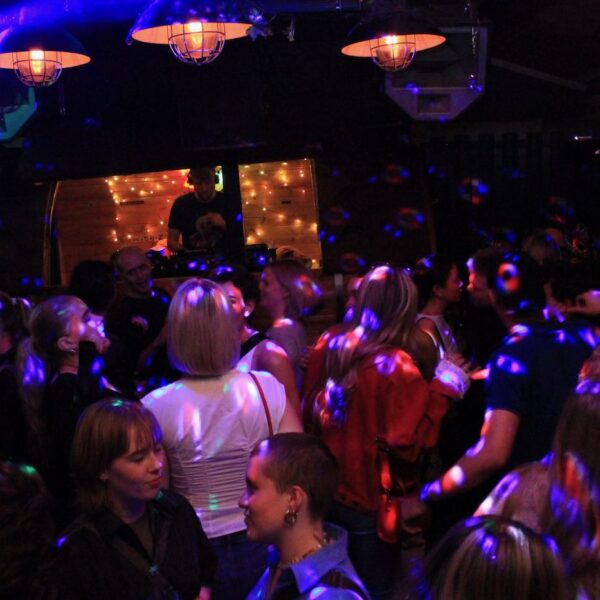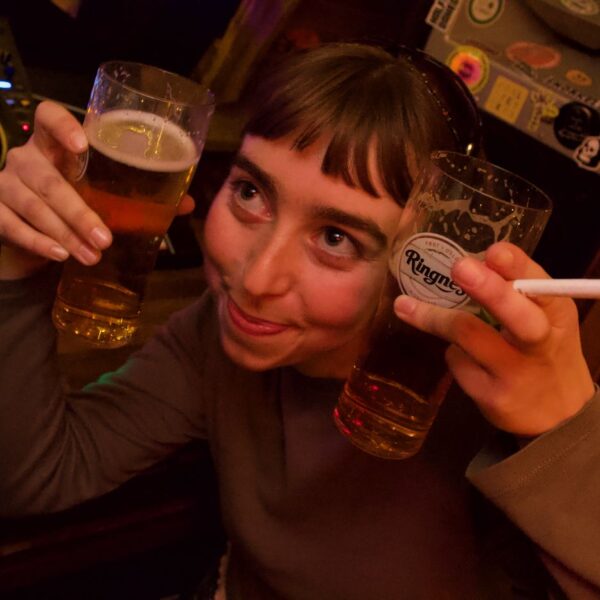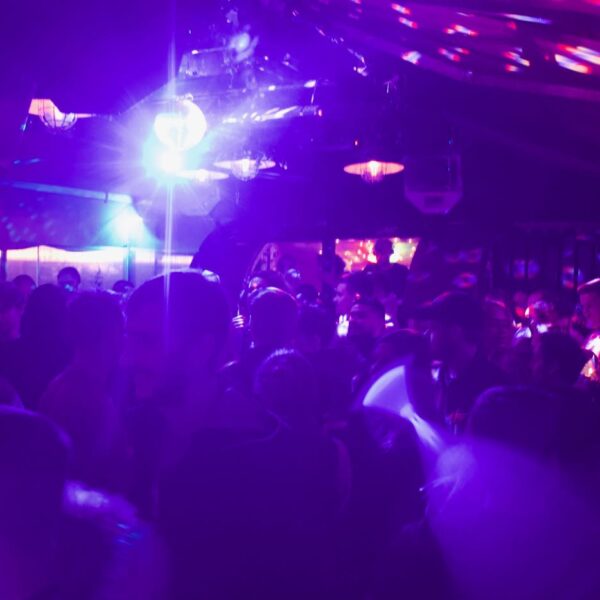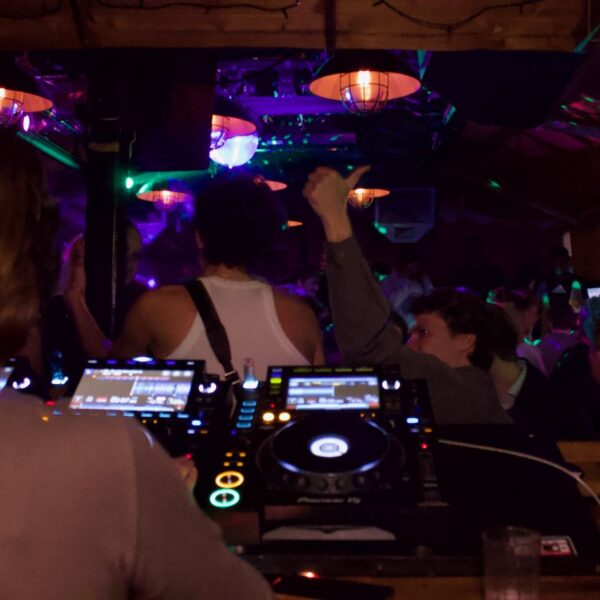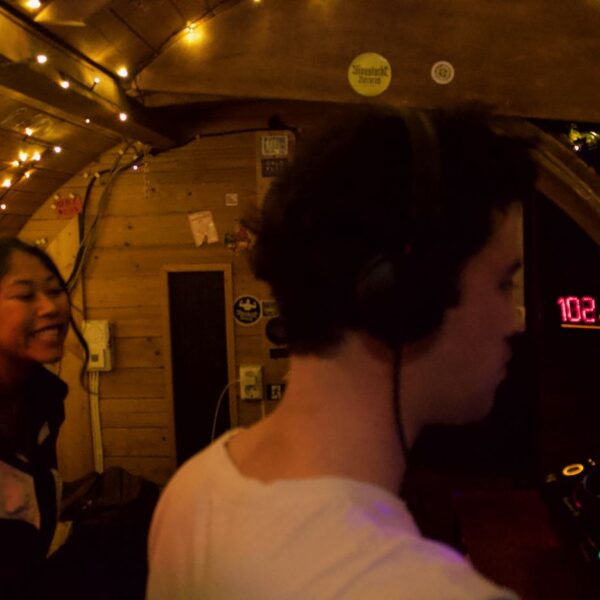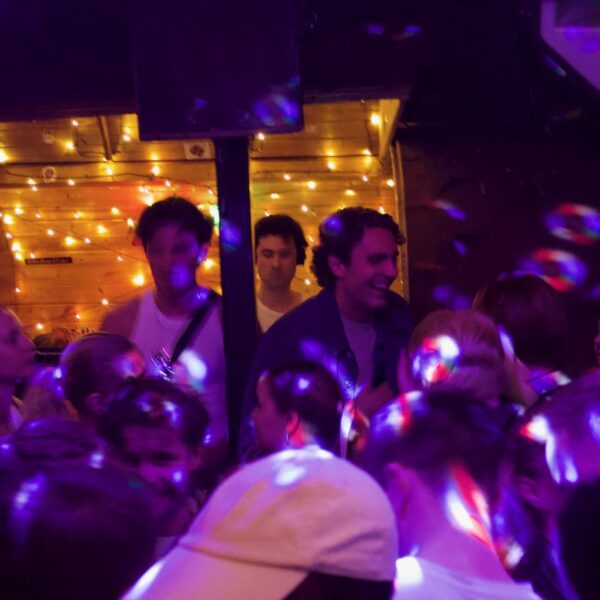Spending a night with our newest residents Mona Blanchard, Axel FU and Dara Woo as they get in a groove with Jaeger’s Tuesday night concept
The dance floor is pulsating to some two-step rhythm like a single human mass. A disassembled vocal interrupts in quaver stutters echoing over the heads of the audience. It’s an unusually warm day for April; arms and legs exposed to the cooling elements. The sound pressure drops with a metronome-like countdown for 16 bars and then with an almighty thud, a kick drum breaks free, moving through the crowd like a sonic tsunami. There’s a physical surge as people bunch into the tight space of Jaeger’s courtyard. It’s hard to believe it’s just past midnight on a Tuesday.
Axel FU (Aksel Aasen) conducts the crowd through the song, massaging the best out of the tracks with some subtle eq nudges. Alongside him Mona Blanchard and Dara Woo wait in the wings for their turn at the helm of their weekly club night, M.A.D; a concept which takes its name from the three DJs at the centre of the night. Tonight it’s certainly living up to its name.
Inaugurated in January 2024, M.A.D is the latest Tuesday concept on Jaeger’s calendar. Its origins lay in the monthly Wednesday night, Frensday, started by Axel and transposes the central theme of that monthly club night to Tuesdays, with Jaeger as the nucleus.
During the day Axel is Jaeger’s bar manager, and Dara has been employed in the bar at various stages of its history. “It’s evolved from the dance floor to. the bar and from the bar to the dance floor again,” and today she is also the assistant bar manager. Both Axel and Dara have DJ’d regularly at Jaeger and it was at Ola Smith-Simonsen’s (DJ Olanskii and head booker at Jaeger) insistence that they created the night, to “freshen (Tuesdays) up,” according to Axel and to ”bring in a young crowd” according to Dara. They enlisted the help of frequent Frensday guest and actual friend Mona Blanchard and set off establishing the Tuesday concept in what was one of the harshest of winters in living memory in Oslo.
M.A.D follows a history of concepts that have always found different solutions to what is probably one of the most difficult nights to pull off on a club’s weekly programming. The common consensus, including Dara’s, is that Tuesdays “suck” as a club night, but there is still potential there. It requires something “interesting” to draw people in and more importantly bring them back, but even with the club night in its infancy, Axel can already “see people coming back, and a lot of different people coming back.”
This latest Tuesday is the culmination of all these efforts coming to fruition. Axel is at the controls, and the energy is frenetic. “It’s easy to maintain that energy if that crowd is there,” he remarks later. There’s a sense of hedonism in the air, the unbridled enthusiasm of youth that a lack of “grown-up” responsibility brings with it. The music is frenzied and uninhibited; each DJ follows in the sonic footsteps of the last, without necessarily stepping on the other’s toes.
It’s taken the trio of DJs since the start of the concept, back in January, to find each other musically. While their “biggest challenge” is still going back to back, Axel feels that they are at a point where they can at least ”reach each other halfway” with Axel sandwiched in that middle position between Dara and Mona, musically speaking. “We are quite different in our range of music and groups, which is really interesting,” explains Dara. They’ve all played together at some point in the past, but as a trio, these Tuesdays have been a baptism of fire.
While one would assume DJing being a common thread between them, there’s an even stronger connection through their love of going out, listening to other DJs, and being in that environment.
Mona, a French/Norwegian moved to Oslo “to experience this part of my culture” six years ago, and fell in with a group of friends where music was the “big link” and DJing was ubiquitous amongst them. It’s through that extended group she met Axel and eventually Dara. Dara, who had ”started to learn how to play ten years ago, but never got to practise, ”has been a fixture on Oslo’s intimate scene, both working in it and being a part of it from the dance floor.
Both Mona and Dara had similar experiences post pandemic when they focussed all their efforts on DJing. Mona had been furlough at the time of that first Frensday, while Dara, exasperated from pursuing a nine to five, poured her efforts into the thing she knew inherently; after all “it’s more fun to be a DJ.”
In what has become a common theme since the covid catastrophe, the M.A.D generation is leading the charge in Oslo for a new wave of club music enthusiasts. It’s as if the lockdown has programmed a permanent F.O.M.O with people like Dara and Mona seemingly constantly on their way to a dance floor.
Mona “need(s) to see people everyday” while Dara always has “some birthday or some friend playing out” even if she’s not playing. Both would “rather go out” than sit at home and the dance floor often beckons in those situations. Mona says she gets her “energy from being around people, and being around people means going out to dance.” Axel is the more reserved of the them, but will still “go out to listen to friends play” and when he’s not working or playing himself, he’ll be at Jaeger listening to one for the guest DJs coming through town.
Has this laid the seed for some kind of scene to exist in Oslo? Big friend groups, many of which include DJs hosting all sorts of parties around the city, seem to have gathered momentum in the last year. Many of them were the ones taking to the forest at a time when the venues were still heavily restricted. Today they seem to be dominating the club spaces around town.
“It could be a community,” suggests Mona “but it’s almost too big to be a community.” With so many of them constituting DJs and each with their own concepts, it appears more fractious than any kind of scene. For Mona it’s a way to compartmentalise her nightlife habits. It’s more about “understanding the events and choosing” which one you’ll attend than any kind of sonic signature. A generation that’s had every style, genre and region of music at their fingertips, music is not as reductive as it used to be, and their tastes have far reaching and overlapping zones of interest. It’s thoroughly represented through the three individuals behind M.A.D.
Mona’s high energy impulses, Dara’s tunnel-carving visions of the dance floor, and Axel’s sprawling tastes, converge in an chaotic tapestry of club music, with no central theme to really speak of. I pry them for any kind of umbrella term, but I’m only met with some vague assertions that won’t exclude anything.
“We’re really different,“ suggests Mona, and “what brings us together is not the kind of music we play, it’s more about this project.” We’re also good at going out of our way to find music that matches each other,” adds Axel. “Here I’m being challenged a lot by trying to find these guys musically” while Dara suggests it’s about always “navigating towards the middle.”
At its heart it’s always about “ discovering new music” according to Mona, and this can take the form of new releases and undiscovered gems from the past. Whatever they do is based on finding that connection with the dance floor. It’s “not alienating a crowd,” according to Axel, but they also understand that the crowd they’ve started cultivating are not going to enjoy any “easy listening” music. They might draw the line at “Skrillex remixes” themselves, but if “somebody were to play it and it works…. Then that’s cool too.”
Every week they “learn something” according to Mona and “it’s always about this night working out.“ And here it becomes about more than just music. From social media’s prevalence – “it’s a free work tool, that would be dumb not to use” – to the finer details of the arrangement of the dance floor – “ I go into floor manager mode before my set” – they go over every aspect of the club night, to make it a success.
Dara and Axel’s experience behind the scenes are crucial, in that they notice “patterns” in everything that they can utilise. Everything from the settings on the heating lamps to the layout of the tables on the fringes of the dance floor plays a role in a sense of inclusivity from the night. “Just working here you pick up on things,” explains Dara. It follows her into the booth where it’s “helped a lot in the last two years” in establishing her role as a DJ too.
It’s hard to quantify that standing behind her as Dara takes the controls from Mona. There’s the slightest of resistance between the two tracks Dara settles into her stint, venturing into the distinctive deep trenches she likes to carve late at night. The fevered crowd finds a new pulse, and the frenzied excitement moves into a harmonious wave ebbing through the night. The rest of the night progresses with the intensity waning little before the curfew bells rings. They’ve found that rare groove of successful club night, and it sounds like they are getting into their stride.

